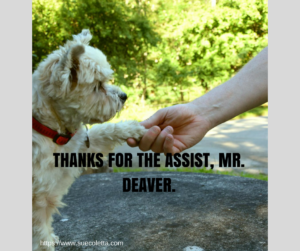Hop in, fellow travelers. Today we’re off on a short, shocking car ride with the protagonist of The List. I hope you’ll take a few moments to read my critique, then add your own comments.
The List
Everyone has lists. I might have too many. I could probably be accused of living my life according to lists. There are the usual: a shopping list, a bucket list, ToDo lists, vacation packing list, followup email list, books to read list, etc. I even have a list of lists, so I don’t forget I have a particular list. But the list I’m thinking about right now is my I-More-Than-Hate-You list. This is the list of people that I plan to take with me if I ever cross thatline. You know the one. The line where you no longer give a flying fuck about the consequences, because someone’s gonna die. That list. And today I’m thinking about that list a lot.
For many years there was one name at the top of my list; one piece of shit that would have to go first. But over time he was replaced by other bastards that needed to die and finally fell off the list completely because I didn’t think I would ever see him again; didn’t think anyone would. But there he was. I almost rear-ended the car in front of me doing a double take.
“No fucking way!!” I said out loud and circled the block to get another look.
Junior Moore was standing on the corner opposite the bus station looking like a gawping tourist. The years hadn’t been good to him. He had always had a grizzled alley-cat look; never more than a fuzz on his scalp and wrinkles like scars all over it. His head looked as if the skin were too big for the skull inside; like badly fitted upholstery. He also looked to have only a single eye and I could see that one ear was mostly gone. His alley-cat glare followed me around the corner. He looked right at me. There’s no way he could have recognized me after all these years, but I’m sure the astonished gasp on my face made him wonder.
“Shit!…shit…shit…” I muttered as I sped toward the Duck. Thirsty Thursday with the girls was going to be interesting.
_______________________________________________________
Our protagonist’s strong voice gives The List a promising start. It takes a considerable amount of practice to make every word sound like it’s coming from a fully conceived character. This character strides onto the page and–to borrow a title from Joan Rivers–enters talking. Good job, brave author.
Let’s talk a moment about the opening paragraphs. I’ve written similar paragraphs many times, and I imagine other TKZers have as well. It’s a Big Intro With a Side of Throat Clearing. Here, you’ve already got the title explained, so that’s out of the way. And you’ve told us a lot about the character. This is an obsessive person. A disturbed person. A Person Not to be Messed With. (I get a strong, post-1978 Shirley MacLaine vibe.) Plus, we have the added bonus of it setting up what’s ahead. But if we look closely, it’s not really a bonus. It’s an impediment to the action of the story.
The reader doesn’t need to be wrapped in a bubble and delivered to the action. Hook us with the action first, and offer explanations and descriptions at a later time, if at all.
Without the throat-clearing, there’s no need for a transition INTO the action. Such a transition is nearly always awkward. When we finally get to the double take/near-accident, we are yanked out of the protagonist’s spotlight monologue intro and plunged into the action. The storytelling changes completely.
Homework for all of the above: Check out James Scott Bell’s latest blog, and all will be revealed.
One of the written and unwritten rules about settings is that you should never set a scene in an automobile. Usually we see two characters talking to one another, either fighting or giving us exposition. (Ah. The stress is off. We’re in the car, gov. Let’s bring each other up to speed on the investigation.) White space would suffice. Here, you have a mix of exposition and action. Because our protagonist is driving when she sees dreaded Junior, the car is perfectly appropriate for the action. Bravo! Now just eliminate the exposition. (Caveat: If you’re reading this and have been thinking about setting a scene in a car, proceed with caution.)
I like the promise of this page. I’m interested in the character, and want to know exactly what Junior Moore did, when he did it, and how/if he’s going to pay. I would definitely read on!
A few words about word choice, punctuation, and description. (I’m not sure of the sex of this character, though from the last line I’ll guess female. Her age is also unclear. She doesn’t sound like a Millennial or younger. And the fact that she’s got a long list of people on her um, shitlist (couldn’t resist), suggests to me that she’s at least in her forties.
First paragraph: I am seeing the word “list” way too many times, and I want it to go away with the paragraph. Have one of the protagonist’s friends make fun of her lists.
There are four semicolons in the piece. I will mourn with you over the loss, but they have to go. Replace them with periods or commas, as you see fit. Oddly enough, sentence fragments are now considered more acceptable than semicolons in fiction. Crazy, right? So feel free to type: But over time he was replaced by other bastards that needed to die and finally fell off the list completely because I didn’t think I would ever see him again. Didn’t think anyone would. But there he was.
Exclamation points and speaking out loud:
“No fucking way!!” I said out loud and circled the block to get another look.”
While this quote is, indeed, an exclamation, we’re only allowed one exclamation point at the end of a sentence. Exceptions are emails and notes to friends and family, birthday cakes, texts, and anything written in sidewalk chalk.
If we are speaking, it’s redundant to say that we’re doing it out loud. (It’s only in the last couple years that I’ve dropped out loud from my own prose.)
No fucking way!” I shouted, slamming one palm against the steering wheel. I circled the block to get another look.
Junior Moore:
Oh, there’s so much to love about this description of Junior Moore. It’s full of spite and anger and fierce observation. It reminds me again of why I’d like to read more. There are a few tweaks that could tighten it up.
“Junior Moore was standing on the corner opposite the bus station looking like a gawping tourist. The years hadn’t been good to him. He had always had a grizzled alley-cat look; never more than a fuzz on his scalp and wrinkles like scars all over it. His head looked as if the skin were too big for the skull inside; like badly fitted upholstery. He also looked to have only a single eye and I could see that one ear was mostly gone. His alley-cat glare followed me around the corner. He looked right at me. There’s no way he could have recognized me after all these years, but I’m sure the astonished gasp on my face made him wonder.”
I won’t totally rewrite the paragraph, but here are some suggestions.
“The years hadn’t been good to him. He had always had a grizzled alley-cat look…”
From here it’s not clear which characteristics Junior had “always had” and which were new. This can be fixed easily with something like:
…The years hadn’t been good to him. While he’d always resembled a grizzled alley cat, now he was downright monstrous (terrifying, hideous, etc). I was stunned to see that he’d lost an eye, and that part of one ear had been torn away. Wrinkles like puckered scars swam between the islands of sparse fuzz on his scalp. One thing that hadn’t changed was the way his skin hung like badly fitted upholstery on his too-small skull. I shuddered. His catlike glare followed me as I turned the corner…
I changed “alley-cat glare” to catlike glare to get rid of the repetition. Taking out “He looked right at me.” makes the image stronger. As a gasp is a sound, you might change “astonished gasp” to astonishment.
That the protagonist is headed to Thirsty Thursday to hang out at the Duck with her girl gang made me smile. Good lead-in to the next scene/chapter.
Language:
Some readers may object to the F-word, etc. I don’t have any concerns myself. In fact, “No fucking way!” is a statement I make way too often. But do check out TKZ takes on profanity. There’s plenty here. Be sure to read comments. Our own Kris Montee/P.J.Parrish takes on profanity in crime stories in a 2016 post. Jordan Dane has a First Page Critique that addresses it as well.
Okay, fellow travelers. You’ve read what I have to say (and thank you for reading!). What comments and advice do you have for our Brave Author?



